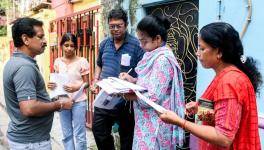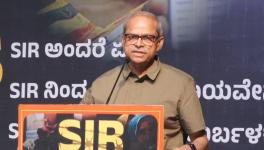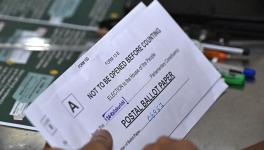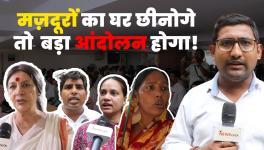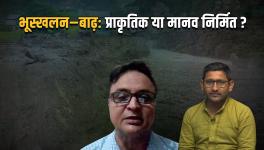SIR Leaves Suicide Trail as BLOs Buckle Under Pressure, Citizens Panic
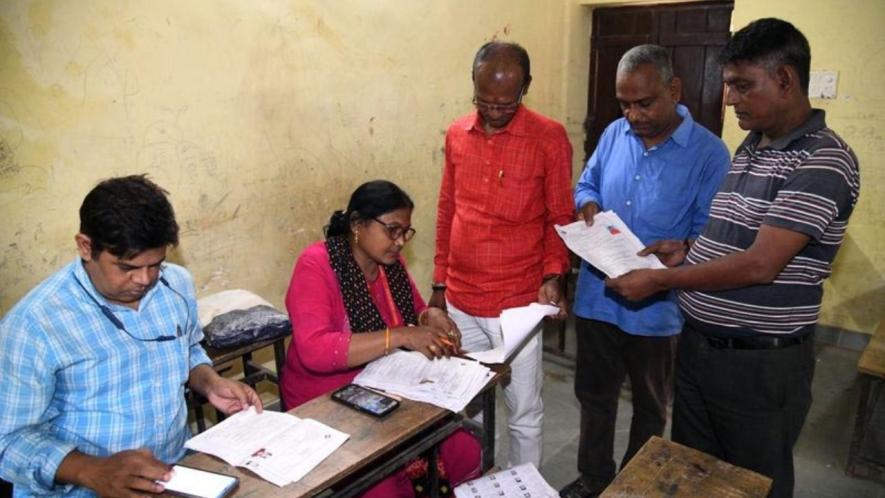
Image: The Tribune
In a series of suicide and harassment incidents have emerged across India over the past month, linking the administrative machinery of elections to a series of suicides and critical mental distress. The focal point of this crisis is the Special Intensive Revision (SIR) of electoral rolls, an exercise currently being undertaken in 12 states and Union Territories.
While the Election Commission of India (ECI) claims that it is to update and purify the voter lists, the methodology being employed on the ground has come under intense scrutiny following the deaths of government employees and citizens.
The exercise, which involves rigorous door-to-door verification, data collection, and digitisation of voter records, has been compressed into a tight schedule. Political leaders and employee unions allege that a process that traditionally spans years has been forced into a two-month window, creating unrealistic targets. This issue has reportedly resulted in “inhuman” work pressure for the foot soldiers of the process—the Booth Level Officers (BLOs)—and ignited fears of disenfranchisement among the poor, reminiscent of the anxieties surrounding the National Register of Citizens (NRC), as per a report in Livemint.
This report details the unfolding tragedy across three states—West Bengal, Rajasthan, and Kerala—documenting the specific incidents of suicide, the allegations of harassment by supervisors, and the systemic failures that have left families in mourning.
West Bengal
West Bengal has reported the highest intensity of distress-related incidents since the enumeration exercise began. The state has witnessed fatalities among officials tasked with the work, as well as suicide attempts by citizens panicked by the sudden demand for documentation.
The suicide of Shantimoni Ekka
In the Rangamati Panchayat of Malbazar, the SIR process claimed the life of Shantimoni Ekka. A 48-year-old Anganwadi worker, Ekka had been conscripted into election duty as a BLO. On November 19, her family’s routine was shattered when they found her body hanging in the courtyard of their home.
The circumstances leading to her death reveal a systemic failure to support ground-level staff. Her family states that she was the sole BLO for her booth and was buckling under the pressure of distributing and collecting forms door-to-door.
According to the Indian Express, her son, Bishu Ekka, spoke to the media about his mother’s deteriorating mental state. He explained that the sheer volume of forms was overwhelming, and a critical language barrier made the task impossible.
“She was very disturbed mentally,” Bishu said.
“She had tremendous work pressure. There was the work pressure of the ICDS (Integrated Child Development Service) and then this BLO duty. There were too many forms, and the forms were in Bengali, and no one was able to help us” as reported
According to the report, this linguistic disconnect was corroborated by her husband, Soko Ekka. He pointed out that while the forms provided by the administration were in Bengali, their area is predominantly Hindi-speaking. This mismatch caused confusion among residents, who were unable to understand the forms or filled them out incorrectly. The burden of rectifying these errors fell entirely on Shantimoni.
“Many are not understanding and filling in wrongly,” Soko said.
He further added that “She was under tremendous pressure; she used to tell me that with the BLO work, she was unable to do any other work”
Most damning is the revelation that Shantimoni had attempted to exit the process before taking her life. Her husband revealed that she had approached officials to resign from her BLO duties. However, her request was summarily rejected. The officer in charge reportedly told her that since her name was already in the system, it could not be cancelled. Feeling trapped between an unyielding administration and an unmanageable workload, she took the extreme step.
“We thought that she had gone to cook in the morning but later, we saw her hanging,” her husband said
Previous fatalities and medical emergencies
Shantimoni Ekka’s death was not an isolated event in the state. Just days prior, on November 9, another BLO named Namita Hansdar died in Purba Bardhaman. Hansdar, who was responsible for booth number 278 in Chowk Balrampur, Memari, suffered a fatal brain stroke. Her family has alleged that the stroke was the direct result of exhaustion, stating she had been forced to work “day and night” to meet the SIR deadlines.
Citizen panic and the shadow of NRC
While officials face administrative pressure, the common citizens of West Bengal are facing a different kind of terror as the fear of statelessness. The SIR exercise involves verifying old records, a process that has inadvertently triggered trauma related to the National Register of Citizens (NRC).
As per a report in Bhaskar English, in North 24 Parganas this fear nearly killed Ashok Sardar. The 63-year-old rickshaw puller from Prafullanagar Low Land, under Kamarhati Municipality, jumped onto the railway tracks near the CCR Bridge at Belgharia. He survived the impact but sustained critical injuries, leading to the amputation of one of his limbs. He remains in a serious condition at RG Kar Hospital.
The police and his family confirmed that his suicide attempt was driven by anxiety over the SIR process. Sardar had recently discovered that he and his wife were unable to locate their names in the 2002 voters’ list. In the current political climate, where documentation is often conflated with citizenship status, this discrepancy caused him to panic.
His daughter, Chaitali Sarkar, explained his mindset that “For days, father kept saying he had no documents. He feared he might be thrown out of the country. That fear may have driven him to do this.”
According to police sources, Sardar had been living in “persistent fear” after hearing about the distribution of forms and the document requirements mandated by the SIR exercise.
Political confrontation
The rising death toll has led to a sharp confrontation between the West Bengal government and the Election Commission. Chief Minister Mamata Banerjee took to social media platform X to express her shock, stating that “28 people have already lost their lives since SIR began.”
She categorised these deaths as a result of fear, uncertainty, stress, and overload.
Banerjee followed this public statement with a formal letter to Chief Election Commissioner Gyanesh Kumar. In the letter, she called for an immediate halt to the SIR drive, describing it as “unplanned, chaotic, and dangerous.”
“I am compelled to write to you as the situation surrounding the ongoing Special Intensive Revision (SIR) has reached a deeply alarming stage,” Banerjee wrote.
CM Banerjee said that “The manner in which this exercise is being forced upon officials and citizens is not only unplanned and chaotic, but also dangerous… A process that earlier took 3 years is now being forced into 2 months on the eve of elections to please political masters, putting inhuman pressure on BLOs.”
She urged the ECI to “act with conscience” and stop the drive before more lives were lost.
In contrast, the Leader of the Opposition in the Bengal Assembly, Suvendu Adhikari, defended the Election Commission. He attributed the issues to local administrative mismanagement rather than the central directive. Speaking to the media, Adhikari said, “I have found out the reason is the joint BDO. The EC has no role. The TMC was to destroy the SIR, but we are happy that the SIR has begun in Bengal.”
He claimed that in other states where SIR is ongoing, “nothing is happening,” and that the crisis was specific to TMC-ruled Bengal.
Rajasthan
The crisis is not limited to Bengal, reports from Rajasthan indicate similar distress among government employees. In Jaipur, the pressure of the SIR exercise resulted in the suicide of a government school teacher, Mukesh Chand Jangid.
The death of Mukesh Chand Jangid
Jangid, who was serving as a BLO, died by suicide on November 16, by jumping in front of a train. Unlike the cases in Bengal where general pressure was blamed, Jangid left behind specific evidence of harassment. A suicide note recovered from his pocket accused his supervisor, Sitaram Bunkar, of mental harassment and repeated threats of suspension.
The timeline of his death, reconstructed by his family, paints a picture of a dedicated officer pushed to the brink. His younger brother, Gajanan, revealed that the suicide note was dated November 13—three days before his death. This suggests Jangid had been carrying the note while continuing to perform his duties.
According to Dainik Bhaskar, on the evening of November 15, Jangid received a long phone call from his supervisor. Following the call, at 9:30 PM, he handed a thick bundle of voter forms to his younger brother, asking him to paste passport-sized photographs on them, indicating he was still trying to complete the work.
The next morning, at 4:45 AM, he left his home in Dharampura (Kalwar) in his home clothes. At 6:45 AM, the family received a call from the Bindayka police station asking them to identify his body on the railway tracks.
Technical failures and “digital” pressure
Jangid’s son, 10-year-old Revanshu, provided insight into the technical struggles his father faced. As part of the modernisation of the electoral rolls, BLOs are required to collect data offline and then upload it to a central server. This process was reportedly fraught with glitches.
Revanshu said that his father working late into the night, struggling with the upload process, and often seeking help from colleagues who were equally helpless. When the child asked when the work would finish, Jangid replied that he did not know when it would end.
Family’s allegations of cover-up
The aftermath of Jangid’s death has been marked by conflict between the family and the police. Mukesh’s uncle, Bhanwarlal Jangid, stated that the police have refused to hand over copies of the suicide note or the FIR to the family. The investigating officer reportedly only read the note aloud to them. The family has expressed deep dissatisfaction with the investigation, though CI Vinod Kumar has assured that those named in the note will be questioned.
The tragedy has devastated the family’s future. Jangid is survived by his wife, Meena Devi, and two daughters, Annu (23) and Jyoti (21). Both daughters are engaged to be married next year. Instead of wedding preparations, the household is now in mourning, as reported
Kerala
In Kerala, the suicide of a BLO has sparked a massive mobilisation of state government employees, leading to strikes and boycotts.
The death of Aneesh George
Aneesh George, a 44-year-old BLO in the Payyannur Assembly constituency of Kannur, was found hanging in his house on a Sunday. His family immediately attributed his death to the intense pressure to complete the SIR enumeration process by the December 4 deadline.
The political reaction in Kerala mirrored the polarisation seen in other states. According to the Telegraph India, leader of the opposition V.D. Satheesan alleged that George had faced threats from CPM workers after a Congress booth-level agent accompanied him for enumeration. The CPM, however, rejected these claims, with Kannur district secretary K.K. Ragesh stating that George’s death was not an isolated incident but part of a pattern seen in Rajasthan and Bengal due to ECI targets.
Leaked audio and “dire consequences”
The allegations of coercion gained credibility when local television channels aired a leaked audio message from an electoral registration officer in Pathanamthitta district. In the recording, the officer is heard warning BLOs of “dire consequences” if they failed to meet the strict targets set for the revision process. This audio confirmed the fears of many employees that their jobs were on the line if they could not keep up with the accelerated pace, as reported
Mass boycott
In response to the suicide and the threats, the trade unions of Kerala mobilised. On November 17, approximately 35,000 BLOs across the state boycotted SIR work. Under the banner of various state government employee unions, they held protests outside the Chief Electoral Office in Thiruvananthapuram and at district collectorates.
The protesting employees demanded that the authorities refrain from exerting excessive pressure and called for a postponement of the SIR process, citing the upcoming local body elections in December as a reason for the unbearable workload.
A systemic crisis
The events in West Bengal, Rajasthan, and Kerala highlight a fundamental disconnect between the claims of the Election Commission and the human capacity of its workforce.
West Bengal CM Mamata Banerjee in her letter to the CEC noted that the process suffers from “critical gaps in training, lack of clarity on mandatory documentation and the near-impossibility of meeting voters in the midst of their livelihood schedules.” The shift from a multi-year timeline to a two-month sprint has removed the necessary buffer for error correction and stress management.
Furthermore, the legal context remains complicated. The SIR process was challenged in the Supreme Court after it was launched in Bihar, and the matter remains pending. While the Court has issued directions regarding the use of Aadhaar cards for identity verification, the implementation on the ground remains chaotic.
While officials have noted that the SIR exercise concluded without such fatalities in Bihar, the rising body count in other states suggests that the “Bihar model” is not seamlessly replicable. Whether it is the language barrier in Malbazar, the digital divide in Jaipur, or the political volatility in Kannur, the “one size fits all” approach is failing.
The human cost of documentation
The climate of fear produced by the SIR drive is inseparable from the shadows cast by earlier citizenship exercises such as the NRC and the CAA. The recent death of 57-year-old Pradip Kar from Agarpara in North 24 Parganas is the latest tragic reminder of how deeply these anxieties have penetrated everyday life in Bengal. On October 28, 2025, Kar was found hanging in his home, leaving behind a note that read “NRC is responsible for my death.”
According to Sabrang India, Kar’s family said he had grown visibly distressed after the Election Commission announced the SIR across 12 states, including West Bengal—a move widely feared in the state as a precursor to an NRC-like process. Barrackpore Police Commissioner Murlidhar Sharma confirmed that while no foul play was detected, the suicide note made an explicit reference to the NRC. “The family told us he was deeply disturbed by NRC-related reports. After the SIR announcement, he appeared anxious, but they assumed it was illness,” Sharma said. Kar’s sister added that he repeatedly told the family, “They will take me away in the name of NRC.”
Kar’s death mirrored the earlier tragedy of 31-year-old Debashish Sengupta from Kolkata, who died by suicide in March 2024 after being consumed by fears induced by the Citizenship Amendment Act (CAA). As reported by Sabrang India, Sengupta—who was visiting his grandparents in South 24 Parganas—was found hanging after confiding that his ailing father, a migrant from Bangladesh, could be denied citizenship due to inadequate documents. His family said he was “consumed by dread” that the newly notified CAA rules would render many stateless.
These deaths are no longer isolated cases as they are symptomatic of a broader psychological crisis in which bureaucratic exercises intended to update records instead evoke existential fears of erasure. Across Bengal, whispers that “NRC is coming through the backdoor” have gained the weight of lived experience. For vulnerable citizens, the acceleration of documentation requirements—whether through SIR, NRC, or CAA—has become indistinguishable from a threat to their very belonging.
Courtesy: Sabrang India
Get the latest reports & analysis with people's perspective on Protests, movements & deep analytical videos, discussions of the current affairs in your Telegram app. Subscribe to NewsClick's Telegram channel & get Real-Time updates on stories, as they get published on our website.












